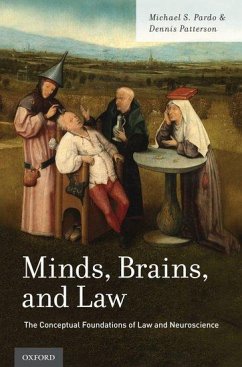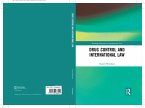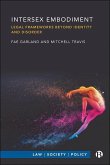Michael S. Pardo (Henry Upson Si Henry Upson Sims Professor of Law, Dennis Patterson (Board of Governors Professor of Law and Philosoph
Minds, Brains, and Law
The Conceptual Foundations of Law and Neuroscience
Michael S. Pardo (Henry Upson Si Henry Upson Sims Professor of Law, Dennis Patterson (Board of Governors Professor of Law and Philosoph
Minds, Brains, and Law
The Conceptual Foundations of Law and Neuroscience
- Gebundenes Buch
- Merkliste
- Auf die Merkliste
- Bewerten Bewerten
- Teilen
- Produkt teilen
- Produkterinnerung
- Produkterinnerung
This book addresses the philosophical questions that arise when neuroscientific research and technology are applied in the legal system. The empirical, practical, ethical, and conceptual issues that Pardo and Patterson seek to redress will deeply influence how we negotiate and implement the fruits of neuroscience in law and policy in the future.
Andere Kunden interessierten sich auch für
![Global Health Law & Policy Global Health Law & Policy]() Global Health Law & Policy146,99 €
Global Health Law & Policy146,99 €![Drug Control and International Law Drug Control and International Law]() Daniel WisehartDrug Control and International Law45,99 €
Daniel WisehartDrug Control and International Law45,99 €![Global Pandemics and International Law Global Pandemics and International Law]() Ilja PavoneGlobal Pandemics and International Law142,99 €
Ilja PavoneGlobal Pandemics and International Law142,99 €![Intersex Embodiment Intersex Embodiment]() Fae Garland (University of Manchester)Intersex Embodiment143,99 €
Fae Garland (University of Manchester)Intersex Embodiment143,99 €![Medical Trade, Public Health, and the Law Medical Trade, Public Health, and the Law]() Nayung Kim (School of Law, Kangwon National University, South KoreaMedical Trade, Public Health, and the Law161,99 €
Nayung Kim (School of Law, Kangwon National University, South KoreaMedical Trade, Public Health, and the Law161,99 €![Decisional Privacy and the Rights of the Child Decisional Privacy and the Rights of the Child]() Georgina DimopoulosDecisional Privacy and the Rights of the Child42,99 €
Georgina DimopoulosDecisional Privacy and the Rights of the Child42,99 €![Zoo Veterinarians Zoo Veterinarians]() Irus BravermanZoo Veterinarians25,99 €
Irus BravermanZoo Veterinarians25,99 €-
-
-
This book addresses the philosophical questions that arise when neuroscientific research and technology are applied in the legal system. The empirical, practical, ethical, and conceptual issues that Pardo and Patterson seek to redress will deeply influence how we negotiate and implement the fruits of neuroscience in law and policy in the future.
Hinweis: Dieser Artikel kann nur an eine deutsche Lieferadresse ausgeliefert werden.
Hinweis: Dieser Artikel kann nur an eine deutsche Lieferadresse ausgeliefert werden.
Produktdetails
- Produktdetails
- Verlag: Oxford University Press Inc
- Seitenzahl: 272
- Erscheinungstermin: 12. November 2013
- Englisch
- Abmessung: 241mm x 161mm x 25mm
- Gewicht: 598g
- ISBN-13: 9780199812134
- ISBN-10: 0199812136
- Artikelnr.: 38051308
- Herstellerkennzeichnung
- Libri GmbH
- Europaallee 1
- 36244 Bad Hersfeld
- gpsr@libri.de
- Verlag: Oxford University Press Inc
- Seitenzahl: 272
- Erscheinungstermin: 12. November 2013
- Englisch
- Abmessung: 241mm x 161mm x 25mm
- Gewicht: 598g
- ISBN-13: 9780199812134
- ISBN-10: 0199812136
- Artikelnr.: 38051308
- Herstellerkennzeichnung
- Libri GmbH
- Europaallee 1
- 36244 Bad Hersfeld
- gpsr@libri.de
Michael S. Pardo is the Henry Upson Sims Professor of Law at the University of Alabama School of Law. His scholarship explores epistemological issues in the areas of evidence, criminal procedure, civil procedure, and jurisprudence, with a specific focus regarding evidence and legal proof. He is the co-author of the fifth edition of Evidence: Text, Problems, and Cases (2011, with Allen, Kuhns, Swift, and Schwartz). He received his JD from Northwestern University School of Law. Dennis Patterson is the chair in Legal Philosophy and Legal Theory at the European University Institute, and is also the Board of Governors Professor of Law and Philosophy at Rutgers University School of Law, and chair in Jurisprudence and International Trade at Swansea University. His scholarship includes commercial law, trade law, and legal philosophy. Patterson is the author of Law and Truth (Oxford University Press, 1996) and The New Global Trading Order (2008, with Ari Afilalo).
* Preface
* Introduction
* Chapter One: Philosophical Issues
* I. The Conceptual and the Empirical
* II. Criterial and Inductive Evidence
* III. Unconscious Rule Following
* IV. Interpretation
* V. Knowledge
* VI. The Mereological Fallacy
* Chapter Two: The Concept of Mind
* I. Neuro-Reductionism
* II. Eliminative Materialism and the "Theory" of Folk Psychology
* III. Two Examples of Neuro-Reductionism and Its Implications for Law
* IV. Conceptions of Mind and the Role of Neuroscience in Law
* Chapter Three: Neuroscience and Legal Theory: Jurisprudence,
Morality, and Economics
* I. Jurisprudence
* II. Emotion and Moral Judgments
* III. Mind, Moral Grammar, and Knowledge
* IV. Neuroeconomics
* Chapter Four: Brain-Based Lie Detection
* I. fMRI Lie Detection
* II. EEG Lie Detection ("Brain Fingerprinting")
* III. Analysis: Empirical, Conceptual, and Practical Issues
* Chapter Five: Criminal Law Doctrine
* I. Actus reus
* II. Mens rea
* III. Insanity
* Chapter Six: Criminal Procedure
* I. Fourth Amendment
* II. Fifth Amendment
* III. Due Process
* Chapter Seven: Theories of Criminal Punishment
* I. A Brief Taxonomy of Theories of Criminal Punishment
* II. The First Challenge: Brains and Punishment Decisions
* III. The Second Challenge: Neuroscience and Intuitions about
Punishment
* Conclusion
* Bibliography
* Introduction
* Chapter One: Philosophical Issues
* I. The Conceptual and the Empirical
* II. Criterial and Inductive Evidence
* III. Unconscious Rule Following
* IV. Interpretation
* V. Knowledge
* VI. The Mereological Fallacy
* Chapter Two: The Concept of Mind
* I. Neuro-Reductionism
* II. Eliminative Materialism and the "Theory" of Folk Psychology
* III. Two Examples of Neuro-Reductionism and Its Implications for Law
* IV. Conceptions of Mind and the Role of Neuroscience in Law
* Chapter Three: Neuroscience and Legal Theory: Jurisprudence,
Morality, and Economics
* I. Jurisprudence
* II. Emotion and Moral Judgments
* III. Mind, Moral Grammar, and Knowledge
* IV. Neuroeconomics
* Chapter Four: Brain-Based Lie Detection
* I. fMRI Lie Detection
* II. EEG Lie Detection ("Brain Fingerprinting")
* III. Analysis: Empirical, Conceptual, and Practical Issues
* Chapter Five: Criminal Law Doctrine
* I. Actus reus
* II. Mens rea
* III. Insanity
* Chapter Six: Criminal Procedure
* I. Fourth Amendment
* II. Fifth Amendment
* III. Due Process
* Chapter Seven: Theories of Criminal Punishment
* I. A Brief Taxonomy of Theories of Criminal Punishment
* II. The First Challenge: Brains and Punishment Decisions
* III. The Second Challenge: Neuroscience and Intuitions about
Punishment
* Conclusion
* Bibliography
* Preface
* Introduction
* Chapter One: Philosophical Issues
* I. The Conceptual and the Empirical
* II. Criterial and Inductive Evidence
* III. Unconscious Rule Following
* IV. Interpretation
* V. Knowledge
* VI. The Mereological Fallacy
* Chapter Two: The Concept of Mind
* I. Neuro-Reductionism
* II. Eliminative Materialism and the "Theory" of Folk Psychology
* III. Two Examples of Neuro-Reductionism and Its Implications for Law
* IV. Conceptions of Mind and the Role of Neuroscience in Law
* Chapter Three: Neuroscience and Legal Theory: Jurisprudence,
Morality, and Economics
* I. Jurisprudence
* II. Emotion and Moral Judgments
* III. Mind, Moral Grammar, and Knowledge
* IV. Neuroeconomics
* Chapter Four: Brain-Based Lie Detection
* I. fMRI Lie Detection
* II. EEG Lie Detection ("Brain Fingerprinting")
* III. Analysis: Empirical, Conceptual, and Practical Issues
* Chapter Five: Criminal Law Doctrine
* I. Actus reus
* II. Mens rea
* III. Insanity
* Chapter Six: Criminal Procedure
* I. Fourth Amendment
* II. Fifth Amendment
* III. Due Process
* Chapter Seven: Theories of Criminal Punishment
* I. A Brief Taxonomy of Theories of Criminal Punishment
* II. The First Challenge: Brains and Punishment Decisions
* III. The Second Challenge: Neuroscience and Intuitions about
Punishment
* Conclusion
* Bibliography
* Introduction
* Chapter One: Philosophical Issues
* I. The Conceptual and the Empirical
* II. Criterial and Inductive Evidence
* III. Unconscious Rule Following
* IV. Interpretation
* V. Knowledge
* VI. The Mereological Fallacy
* Chapter Two: The Concept of Mind
* I. Neuro-Reductionism
* II. Eliminative Materialism and the "Theory" of Folk Psychology
* III. Two Examples of Neuro-Reductionism and Its Implications for Law
* IV. Conceptions of Mind and the Role of Neuroscience in Law
* Chapter Three: Neuroscience and Legal Theory: Jurisprudence,
Morality, and Economics
* I. Jurisprudence
* II. Emotion and Moral Judgments
* III. Mind, Moral Grammar, and Knowledge
* IV. Neuroeconomics
* Chapter Four: Brain-Based Lie Detection
* I. fMRI Lie Detection
* II. EEG Lie Detection ("Brain Fingerprinting")
* III. Analysis: Empirical, Conceptual, and Practical Issues
* Chapter Five: Criminal Law Doctrine
* I. Actus reus
* II. Mens rea
* III. Insanity
* Chapter Six: Criminal Procedure
* I. Fourth Amendment
* II. Fifth Amendment
* III. Due Process
* Chapter Seven: Theories of Criminal Punishment
* I. A Brief Taxonomy of Theories of Criminal Punishment
* II. The First Challenge: Brains and Punishment Decisions
* III. The Second Challenge: Neuroscience and Intuitions about
Punishment
* Conclusion
* Bibliography








